Sans pitié ni remords - Nicolas Lebel
All the expected character types are there, the cynical, world-weary police criminal investigator with a colourful team and incompetent bosses. Mehrlicht, a heavy drinker and heavy smoker of Gauloises, does however have good reason to be self-absorbed this time, as he has just buried his best friend. His intention to take a leave of absence is abruptly cancelled however when he is brought in by another division dealing with a long-standing case of missing African artefact. When a diamond belonging to one of the missing artefacts is handed over to Mehrlicht at the reading of Jacques will, the case blows open again, putting Mehrlicht in a lot of trouble.
Not as much trouble as the museum employees who unwittingly helped criminals steal these precious artefacts between 2003 and 2006. Twelve years later, a ruthless international assassin known as The Corsican and his Russian partner in death-dealing, Vlad, are making their way through a list of employees and killing them, making it look like accidents or suicides. Not convincingly enough for Mehrlicht s team however, but since the captain is on a leave of absence and under investigation, they are being managed by a small-minded racist chief who is incredibly dense and keen to look for an easier explanation. Soon however it's all going to be too much to dismiss as coincidence, but will it come soon enough to save any of the museum employees from the brutal assassins?
The characterisation is a bit thin, the drama a bit contrived and heavy-handed, Lebel lays on the racist roles thick and the mentality behind it is unconvincing. With an 'The Guardian of the Spirits' an ethnic artefact that seems to carry a curse, the plot even starts to feel like a bit of Tintin and the Seven Crystal Balls hokum. Lebel's fast moving plot and escalation however doesn't give you time to worry about this too much and, when you scratch beneath the surface, all the characters actually have more than one side to their character, with even the worst showing some redeeming features. And, with its colonial history, Sans pitié ni remords probably reflects certain attitudes and divisions in French society more realistically than you might think, but primarily, Lebel develops a situation out of this that is hugely entertaining and not for a single second dull.




Comments
Post a Comment